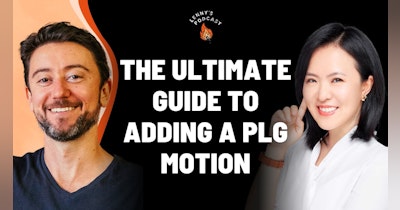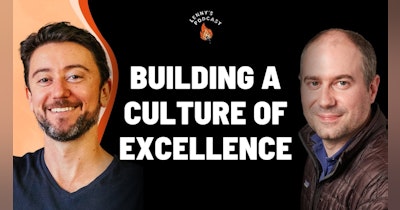It took just seven years for Ada Chen Rekhi to go from entry-level sales at Microsoft to SVP of marketing at SurveyMonkey. Not to mention she founded her first company (and sold it to LinkedIn) along the way.
But Ada didn’t start her career with the goal of leading a Fortune 500 company’s global marketing team — or founding multiple successful tech startups. Instead of laser-focusing on a concrete plan, Ada let curiosity guide her. And that curiosity, along with a willingness to take risks, put her on the fast track to success.
Today, Ada is co-founder and COO of Notejoy, a collaborative notes app for business teams. She also offers executive coaching to founders looking to scale their whole selves as they scale their organizations. She has wisdom to share, and she stopped by Lenny’s Podcast to offer expert advice on decision-making and building a career that brings you true happiness, including tactics for knowing when to quit your job.
How to ask for advice (and get answers you can actually use)
Whether you’re thinking of quitting your current job or considering a step forward on your career path, it’s normal to seek advice from friends, loved ones, and even colleagues. But simply asking, “Should I quit my job?” is unlikely to yield a helpful response, even if you know the people you’re polling offer top-notch career advice.
Why? Because context matters, says Ada. “There’s a lot of bad advice out there,” she explains. “And it’s not bad because it’s not well-intentioned, but it’s bad because it’s not contextual. So when someone tells you to quit your job and chase your dreams, or they tell you to sit tight and grind through and build some experience before you go off and go start the company that you’ve always been thinking about starting, which piece of advice do you actually take?”
Ada recommends adopting a framework she calls “curiosity loops,” which you can (and should) use when asking for advice about resigning from a position and seeking a new job. These loops are the process of approaching people whose input you trust with intentional, useful questions. And the first step is thinking about what makes a question “good.”
Here’s what Ada says defines a good question:
- It’s specific. Don’t put the cognitive load on other people by asking something vague, like “What should I do with my career next?”
- It’s unbiased. Since people have a tendency to agree with you, don’t give your opinion before they’ve had a chance to think about the question.
- It solicits rationale. Instead of asking an open-ended or yes-or-no question, provide options (with context). Then, ask the person which choice they prefer and why.
Another crucial aspect of curiosity loops is that they seek wisdom about the job search from several people, not just your best friend or your mom. Carefully curate your list of advisors to collect diverse perspectives on everything from exit interviews to setting updated career goals.
In the case of trying to determine when it’s time to leave a job, the best mix of people to ask for advice would include subject matter experts (likely someone from your professional network) and people who know you well enough to provide valuable insights on how different options might suit you.
Don’t be the frog
Not every career change happens because a better opportunity falls into your lap or a red flag-riddled toxic work environment pushes you out. You may just have a nagging feeling that it’s time for your next career change — and that’s an instinct Ada says you should pay attention to, even if you don’t act on it right away.
“Don’t be the frog,” she says. This refers to the allegorical story of a frog in boiling water. If that frog is sitting in a lukewarm pot with a slow increase in temperature, it might not notice it’s in hot water until it’s too late. In the professional world, that danger might look like burnout, negative company culture, or even just itching for a transition. “It’s really easy for all of us to be the frog, where there are little things that make us uncomfortable, and we sit with them.”
Here are some other ways to tell when the water’s getting hot:
- Your role limits you from growth
- You’re not learning anything new
- You feel disconnected from the thesis of the company
- You aren’t working toward a larger goal
- You don’t actually enjoy what you’re doing
- You’ve asked for change but haven’t seen action
- Your environment feels toxic
- Other people are encouraging you to resign
- You feel undervalued by your co-workers and managers
- You think about quitting often
A little discomfort isn’t necessarily a sign that you need to quit your job now. Maybe things aren’t perfect, but you’re learning and growing enough to warrant staying in your position. It’s when that growth stagnates that it’s time to consider putting in your two-week notice.
If your job starts to feel like a dead end, Ada advises becoming an agent in your own career goals. “It doesn’t necessarily mean that the strategy is to quit your job and do something catastrophic,” she says. “It might actually mean a proactive conversation with your manager or the leadership to say, ‘I love what I’m doing here, and I would also like to learn a little bit more.’”
What’s most important is that, at this stage, you know whether your pot of water is starting to boil or not. If you’re discontent at your job and don’t have the career development, work-life balance, or employer recognition to show for it, it’s a sign that something needs to change.
To explore or to exploit?
Maybe you’re not dealing with a toxic workplace, the repercussions of the Great Resignation, or other warning signs that you should quit your job — but you still can’t shake the feeling that it’s time for something new. If the advice from your curiosity loops hasn’t helped you decide whether to write a resignation letter or stay in your current role, it’s time to employ another favorite framework of Ada’s: explore or exploit.
“You’re either in a mode of explorer, where you have a bunch of unknowns and you’re testing to see whether or not you like it,” she explains. “Or you’re exploiting, where you actually have found something that’s really rich and deep and then you’re just trying to get more.” In other words, explore or exploit means pursuing new horizons or continuing to reap the benefits of your current position.
After leaving her first job at Microsoft, Ada took a marketing role at a browser-based video game startup called Mochi Media. She learned myriad new skills, had fun working in the gaming industry, and enjoyed the dynamic of collaborating with her small group of co-workers. But after three years with the company, she was at a crossroads. “Do I exploit and go deeper into the industry, or do I explore more?” she asked herself.
Only 23 at the time, Ada felt she had little to lose if she continued exploring. She wanted to try her hand at being a founder, so she started Connected, the company that later sold to LinkedIn.
Ada’s advisors might not have recommended she leave behind the security of a full-time role without a guaranteed new job to fall back on. But Mochi Media closed its doors in 2014, and Ada’s career as a founder is still going strong. One heuristic decision at age 23 benefited her life more than any job opportunity or employer.
The moral of Ada’s story? Context is everything when deciding when and how to quit your job. But if you feel the water temperature start to rise, being brave enough to leave the pot might be all you need to walk the path to professional fulfillment.
Start building a joyful career
Career development doesn’t stop when you have a shiny job title. Ada advises asking yourself, “What do I actually want to do? Am I enjoying this?” to dive deeper into what your goals really are. The process never ends, and that’s the beauty of it: “You're never going to end trying to make a better resume and a more awesome background for yourself.”
To continue walking on the path to a career you love, listen to more episodes of Lenny’s Podcast. Hear interviews with world-class product leaders and growth experts to uncover concrete and actionable advice that helps you launch your own product. Listen to the full interview with Ada Chen Rekhi for more tips on making hard decisions and building a career that fulfills you.
Subscribe to Lenny’s Newsletter for answers to reader questions about product and career growth. And be sure to explore the full podcast archive for valuable conversations on topics like:








